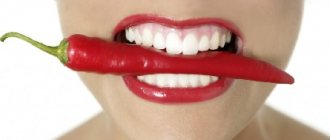A change in taste perception is a sign that signals the possible development of various pathologies in the body.
The most common discomfort conditions include a sweet taste in the mouth; the causes of its occurrence in women and men, diagnostic methods and treatment regimens are discussed in detail in the material below.
General description of the anomaly
The sensation of sweetness, present in the oral cavity for a short time after eating desserts, is a natural, transient reaction of receptor zones that has no clinical significance. The need to visit a doctor is indicated only by phantageusia - the presence of the taste sensations in question in the absence of the influence of irritating substances on the analyzers (cells, their microvilli).
The described pathology can be permanent (protracted) or short-term. It is observed only in the morning or throughout the day, occurs in isolation or is accompanied by additional symptoms. Among the latest:
- bad breath;
- the appearance of dense gray deposits on the tongue;
- heaviness, discomfort in the stomach.
Shades of abnormal taste sensations vary from sweet and sour to cloying, milky and bittersweet.
GERD Treatment Methods
Treatment of GERD is carried out by a gastroenterologist. Treatment is aimed at relieving inflammation of the esophageal mucosa, reducing the frequency of reflux of stomach contents into the esophagus, reducing the damaging properties of refluxate (the substance that enters the esophagus from the stomach), and increasing the protective properties of the esophageal mucosa.
Of great importance is:
Drug treatment
Treatment with medications is prescribed by a doctor and must take into account the individual characteristics of the patient.
Lifestyle change
Normalization of lifestyle is of great importance. It is necessary to quit smoking, limit, or better yet eliminate, alcohol consumption. You should not eat fatty, spicy, sour foods, as well as coffee, tea, chocolate, legumes, cabbage, peas, and brown bread. It is better to take food more often (4-6 times a day), but in small portions. You should not eat before bed (the last meal should be 2-2.5 hours before bedtime). You should sleep with your upper body elevated to reduce the likelihood of reflux during sleep.
Make an appointment Do not self-medicate. Contact our specialists who will correctly diagnose and prescribe treatment.
Reasons why there is a sweet taste in the mouth
The reasons for the appearance of a sweetish taste in the mouth in patients of different genders and ages are almost identical. Conventionally, they can be differentiated into 5 groups. The first includes diseases localized in various organs and tissues. Among them:
- disruptions in the functioning of the gastrointestinal tract and thyroid gland;
- neurological disorders;
- diseases affecting the respiratory system;
- dental diseases.
The second group of factors that provoke the appearance of a persistent sweetish taste in the mouth includes an unbalanced diet and regular overeating.
Experts identify pregnant women as separate categories of patients, as well as people with bad habits and patients who have received chemical poisoning.
Dysfunction of the gastrointestinal tract
Indigestion, gastritis, increased stomach acidity, ulcers, GERD, pancreatitis are diseases that are the most common causes of a sweetish taste in the mouth.
The listed pathological conditions provoke the entry of the contents of a hollow muscular organ into the esophagus. Consequences of abnormalities include heartburn, headache, epigastric discomfort, unpleasant taste in the mouth, and increased salivation. Temporary relief occurs after eating.
Central nervous system disorder, chronic stress
Neurological disorders (especially ailments accompanied by the innervation of facial muscles), prolonged overexertion, lack of proper rest during excessive stress - these are conditions accompanied by a feeling of sweetness in the mouth due to the development of changes in the functioning of taste buds. The symptom is observed in combination with the main signs of disease - lack of appetite, headaches, depression, attacks of dizziness.
Endocrine diseases
Problems with the thyroid and pancreas are also accompanied by the appearance of a sweet taste. The discomfort is permanent and is caused by a disruption in the penetration of glucose into vascular tissues and saliva.
A change in taste perception may be a sign of the development of diabetes. In diabetes, changes in taste sensations are accompanied by hyperhidrosis, thirst, mental lability, skin itching, and a sharp decrease (increase) in body weight.
Respiratory system infections
The natural functioning of receptors in infectious pathologies of lacunae of the tonsils, lungs or nasal sinuses is disrupted by the activity of colonies of microorganisms, as a result of which a purulent focus is formed. The most dangerous pathogen is considered to be Pseudomonas aeruginosa, which causes bronchitis and pneumonia. The main signs of disease are:
- sore throat or chest;
- labored breathing;
- loss of appetite;
- a sharp increase in temperature;
- weakness;
- dry lips
Inflammatory diseases localized in the upper respiratory tract often cause a sweet taste in the mouth and require treatment under medical supervision. Attempts to independently eliminate such ailments are fraught with the development of serious complications, including death.
Diseases of the teeth, oral cavity
Stomatitis
With lesions of the oral mucosa, stomatitis, caries and advanced forms of periodontal disease, the growth and development of colonies of infectious agents leads to the appearance of a sweet taste. When visiting the dentist, men and women talk about the feeling of powdered sugar on the palate (gums), complain about bleeding of soft tissues, pain in the affected area, radiating up, down, and to the sides.
Attempts to relieve discomfort on your own bring relief only for a short time. Dental diseases should only be treated by a specialist.
Additional circumstances
The cause of sweetness in the mouth may be:
- To give up smoking. Regenerating receptors are more strongly affected by irritating substances.
- Chemical poisoning. Pesticides, lead, and phosgene affect the taste buds, changing the way they work.
People who constantly consume high-calorie foods also often suffer from discomfort in the mouth. Doctors, answering patients’ questions about why a sweet, milky taste appears in the mouth, name the following reasons:
- Excessive amount of carbohydrates received (presence of meat, flour, sweet dishes, sweets in the daily menu).
- Binge eating.
- A history of diseases causing metabolic disorders.
Causes of sweet taste in the mouth in women
In pregnant women, discomfort in the mouth may occur due to the development of gestational diabetes. At risk:
- women over 35 years old;
- representatives of the fair sex carrying a large fetus;
- patients suffering from pathological toxicosis, obesity, and gastrointestinal diseases.
The pathology negatively affects the child’s condition, so the detection of a sweet taste in the mouth in the morning or after eating signals the need for immediate contact with the attending physician (gynecologist).
Treatment
Help before diagnosis
To reduce discomfort, first of all you need to change your diet: limit the amount of sweets, white bread, fatty foods as much as possible, increase the content of protein foods, fresh vegetables and fruits. It is important to maintain an adequate drinking regime. To get rid of the obsessive aftertaste, you can eat citrus fruits and drink water with lemon juice.
Doctors recommend maintaining oral hygiene: brush your teeth thoroughly 2 times a day, and use dental floss or a toothpick after eating. To effectively clean the interdental spaces, use a mouthwash or irrigator. A sweet taste that occurs against the background of abdominal pain, heartburn, nausea or vomiting is an indication to consult a specialist.
Conservative therapy
Treatment tactics depend on the cause of the cloying-sweet sensation. Drug therapy is combined with local effects - rinsing the mouth with antiseptic solutions or herbal decoctions, medicinal pastes on the area of the dental canals. The treatment regimen for diseases accompanied by a sweet taste in the mouth often includes:
- Insulin
. Hormone replacement therapy is indicated to normalize glucose concentrations in type 1 diabetes. An intensified treatment regimen with a combination of short- and long-acting insulins is selected. For type 2 diabetes mellitus, oral hypoglycemic drugs are taken. - Enzymes
. Enzyme agents are effective for exocrine pancreatic insufficiency. They improve digestive function and promote the breakdown of fats and carbohydrates. The drugs are prescribed in long courses; preference is given to drugs containing bile acids. - Antisecretory agents
. Medicines reduce the production of hydrochloric acid, thus eliminating the causes of the formation of a sweetish taste. The most commonly used are proton pump inhibitors, which have minimal side effects and a prolonged effect. - Antibiotics
. Purulent lesions of the oral cavity are treated with antibacterial drugs, which are used both systemically in the form of tablets and locally in the form of ointments and applications to the mucous membrane. To prevent candida infection, antifungal agents are recommended.
What does a sweet taste in the mouth mean depending on its manifestation?
Unpleasant taste has various forms of manifestation. Depending on the “shade” of the sensation and the time of its occurrence, one can conclude that various diseases are present.
Thus, a sweet taste that appears in the mouth after waking up is a significant sign indicating the possible development of inflammation of the pancreas.
As the disease progresses, the breakdown of glucose stops, which leads to an increase in blood sugar levels.
Associated symptoms of inflammation of the pancreas are nausea, bloating, pain in the gastrointestinal tract, radiating to the back. Pancreatitis is indicated by frequent belching and excessive salivation. The sensation of sweet taste that appears in the mouth in the morning disappears after eating.
A sweet and sour taste is a sign of latent (asymptomatic) development of diabetes, the presence of a prediabetic state. Bittersweet - diseases of the biliary tract, liver damage.
Oh, how sad I am!
Constant bitterness in the mouth occurs in those who eat too much fatty and fried foods or abuse alcohol, as well as in those who take antibiotics and allergy medications for a long time. But, if a strong bitterness in the mouth constantly bothers you, you need to rush to a gastroenterologist and do an ultrasound of the abdominal organs (liver and gall bladder). Causes of a bitter taste in the mouth:
pathologies of the liver, gallbladder and biliary tract - bitter bile enters the esophagus and mouth;
chronic cholecystitis and cholelithiasis - this may also cause pain under the right rib, nausea and vomiting.
“Express” diagnosis: what tests are done at Health Centers
Read more
Diagnostics
After detecting the symptom in question, it is recommended to consult a therapist or specialists. Among them:
- nutritionist, gastroenterologist;
- dentist, ENT;
- neurologist;
- endocrinologist
The doctor will examine and interview the patient and identify a disease that could lead to the appearance of a constant sweet taste in the mouth. To confirm a preliminary diagnosis, the results of a blood test, urine test and other studies may be needed.
Instrumental diagnostic methods - ultrasound of internal organs, FGS, radiography - help to supplement the obtained clinical picture in order to find out why unpleasant sensations occur.
Diagnosis and treatment of diseases
In addition to natural causes, the taste of garlic in the mouth can be caused by the development of intoxication of the body with heavy metals, dental reasons, or gastrointestinal problems.
Poisoning
In case of arsenic poisoning or selenium overdose, it is necessary to isolate the victim, thereby eliminating the risk of further influence of the harmful factor, and then perform gastric lavage:
- water;
- saline solution prepared from 2 tsp. salts mixed with 1 liter of liquid;
- 20 g of suspension of magnesium sulfate, diluted in 1 liter of water;
- 1 tsp Ipecuana syrup.
Lavage is carried out 2-3 times to completely cleanse the stomach. In an unconscious state, this procedure is performed through a probe.
Garlic taste in mouth
If arsenic or large amounts of selenium enter the skin through the skin, it is necessary to thoroughly clean the skin with a soap solution and running water to prevent further intoxication.
For further treatment, the victim is hospitalized in the toxicology department, where:
- put a dropper with an antidote using Unithiol or Dimercaprol;
- restore the body’s water balance with saline;
- carry out oxygen and vitamin therapy;
- in emergency cases, emerging cardiovascular pathologies and renal failure are corrected.
Dental treatment
The appearance of an unpleasant garlicky taste with the addition of rot occurs due to dental pathologies associated with the formation of stony deposits, as well as poor oral hygiene, which provokes the proliferation of pathogenic bacteria, which become one of the causes of the development of caries and periodontitis.
In this case, thorough sanitation of the oral cavity, including hygienic teeth cleaning, will allow you to eliminate the garlic taste. During the appointment, the doctor will assess the condition of the teeth and gums, remove tartar deposits along with plaque, and then, if necessary, clean out the carious cavity, installing filling material in its place. Additionally, after treatment, the patient will be prescribed a mouth rinse with herbal decoctions or LISTERINE and Sensodyne products.
Treatment of chronic sinusitis and sinusitis
The taste of garlic in the mouth caused by chronic sinusitis requires not only dental, but also ENT treatment, which consists of removing the accumulated pus responsible for the unpleasant symptoms
Teeth cleaning, like sanitation of the oral cavity, is carried out at the initial stage and is accompanied by a thorough examination of the condition of the patient’s teeth and gums for the appearance of carious areas. After this, an ENT doctor is consulted to identify tonsillitis, sinusitis, nasal polyps, rhinitis, which are considered responsible for the garlic taste. For sinusitis and sinusitis, an endoscopic examination of the nasal cavity may also be required.
Additionally, to clarify the diagnosis, the doctor prescribes:
- CT;
- x-ray (panoramic image).
Conservative treatment methods do not solve the problem of unpleasant odor and garlic taste in the mouth, so the patient facing this problem is offered endoscopic sinus surgery, which allows one to carefully remove the pus accumulated in the maxillary sinuses without traumatic punctures. After cleansing, the specialist places a special drainage to prevent re-accumulation of pus, and then the patient is prescribed antibacterial therapy with sensitive antibiotics (Amoxiclav, Suprax, Sumamed).
Additionally, for daily hygiene of the sinuses, rinsing with medicinal solutions (Aqua Maris) is prescribed.
Diagnosis and treatment of gastrointestinal pathologies
The taste of garlic in the mouth, caused by disruption of the digestive tract, gastritis or gastric ulcers, requires contacting a gastroenterologist and carrying out appropriate diagnostics, including laboratory tests and gastroendoscopy.
When the diagnosis is confirmed, the following are prescribed:
- acid neutralizers that accumulate in gastric juice (Maalox, Omez and Almagel);
Omez - antibiotics (Flemoxin solutab and Klacid);
- painkillers (No-shpa, Baralgin).
In emergency cases, surgical treatment may be required.
In addition to medications, the patient is prescribed a special diet that completely excludes:
- fried and salty foods;
- smoked products;
- solid food.
Additionally assigned:
- consumption of activated carbon tablets, as well as using it to clean teeth;
- use of mouth rinses;
- Thorough brushing of not only your teeth, but also your tongue every time after eating food.
Treating a sweet taste in the mouth
The treatment regimen is prescribed taking into account the general condition of the patient, the presence of chronic and concomitant diseases. After successful treatment of the underlying disease, discomfort disappears.
To relieve pathologies, antibiotics, anti-inflammatory medications, and antacids are used, depending on the type of disease. The use of alternative medicine recipes will help to consolidate the achieved results. If the cause of the taste lies in a dental disease, you need to undergo a course of dental treatment.
Knowing why an unpleasant taste appears, you can successfully prevent its occurrence by regularly undergoing medical examinations, correcting your diet, and observing work and rest schedules.
If it was not possible to avoid the manifestation of a symptom, you should immediately contact the clinic - a favorable outcome of any internal diseases is possible only if you receive high-quality and timely therapy.
Taste of garlic in a child
The taste of garlic that appears in a child’s mouth can occur both after eating a vegetable and in the case of using medications containing garlic (choleretic drugs). In addition, a child’s garlic taste is one of the reasons for poor oral hygiene, which provokes the accumulation of bacteria or dental pathologies.
Children can also provoke a garlic taste:
- sore throat and condition of the tonsils;
- gas formation, stomach cramps;
- problems with urination;
- frequent stress.
If you visit the dentist and there are no oral problems, parents should make an appointment for the child to see a therapist to eliminate adenoid diseases, and also take a urine test.
Due to inflamed tonsils
If there is pathology of the tonsils, the baby will be prescribed conservative therapy or surgical removal of the inflamed cavities.
Treatment always begins with conservative therapy, including:
- washing the tonsils with infusion of chamomile or calendula, or saline solutions;
- the use of nasal drops with a drying and anti-inflammatory effect (solutions of protargol, collargol, albucid);
- taking vitamins C, D and ascorutin;
- prescription of physiotherapeutic treatment (UV irradiation of the nasopharynx, electrophoresis with drugs, laser therapy);
In the absence of positive results, as well as in the case of frequent (more than 4 times a year) respiratory diseases, surgical intervention is performed.
Due to problems with urination
To diagnose genitourinary pathologies, it is necessary to take a urine test, after which the doctor may prescribe an ultrasound of the kidneys and bladder, or an x-ray to clarify the diagnosis.
After the diagnosis is made, the following is prescribed:
- antibacterial therapy (Amoxicycline, Ceftrianson or Furazidine);
- ibuprofen;
- desensitizing agents (Loratadine);
- vitamin and mineral complexes.











